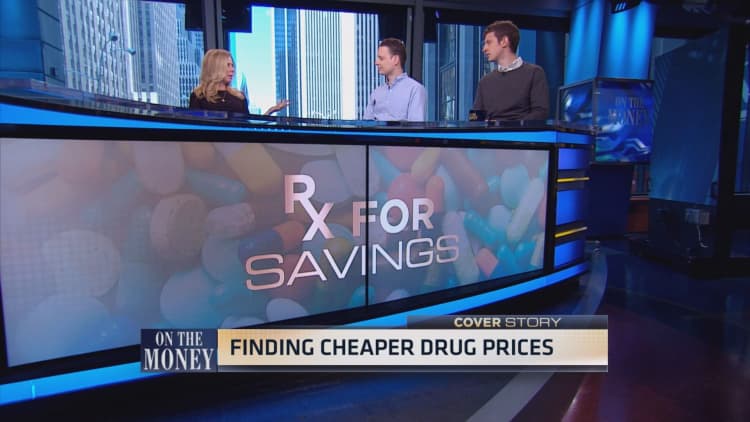
Prescription drug prices are a mystery, but a new start up is disrupting prices for generic drugs across the country.
While there's pricing transparency for most products, costs vary widely for the same medication at different drug stores. The terrain has created an opening for one enterprising start-up looking to shake up the market.
"Technology is sort of realigning a whole host of…industries," Geoffrey Chaiken, Blink Health CEO told CNBC's "On the Money" recently. He mentioned Uber and Groupon as disruptor examples. "It just hadn't happened yet in the pharmaceutical space."
Chaiken and his brother Matthew co-founded and launched Blink Health in February. It's a technology company with a free app and website that promises savings of up to 90 percent on generic drugs. Those savings come in handy in a marketplace where rising prices seem relentless. Last year, prescription drug prices rose 10.43 percent, according to Truveris, a pharmacy pricing platform.
"Anyone in the country can now go to Blink Health.com, type in the name of their medication and see a price," Matthew Chaiken explained, "and know that they can get that price at any pharmacy in the country when they pay in advance on our application and mobile web site."
We're really focused on getting as many members as we can, because the more members we have, the lower prices we can get.Geoffrey ChaikenCEO, Blink Health
According to Blink's website, 30 tablets of the generic cholesterol-lowering medication, Lipitor, would cost $163.24 without insurance. The Blink price is $9.94, which is less than most insurance co-pays.
"It's primarily about power in numbers," CEO Geoffrey Chaiken said. "So we're able to group our Americans together with a whole host of others, about 25 million and that gives us the negotiating power to get much lower prices for all of our users."
Blink Health has partnered with pharmacy benefit manager MedImpact for access to its 25 million members and its pharmacy network.
Membership in Blink Health is free, but the Chaikens won't disclose how many members they have except to say "it's in the hundreds of thousands."
COO Matthew Chaiken told CNBC that "over 50 percent of our medications are less than 10 dollars and tons of medications are less than five dollars, so you imagine that our margin on any given medication is pretty thin."
Blink makes money "by negotiating, so we negotiate rates with every pharmacy in the country for those prescription medications." Geoffrey explained that surprisingly, not every drug purchase is profitable for Blink Health. "So, we make, depending on which drug you take and which pharmacy you go to, a little bit of money, we actually can lose money as well. "
Geoffrey said there hasn't been a backlash from traditional drug providers as Blink Health has entered the arena. However, he said most major insurance companies have contacted them. "They know the future in healthcare is consumerism, and we're trying to figure out ways of collaborating."
High prescription drug prices are a real barrier for the sick and afflicted. According to the Kaiser Family Foundation study, 24 percent of Americans didn't fill a prescription last year because of the high cost, while 19 percent said they skipped a dose or cut pills in half for the same reason.
Geoffrey said his company was part of the solution to make drug prices cheaper. "So there's just a huge opportunity actually for everyone to win because if you make prescriptions more affordable then (patients) take them and that helps everyone in the (health care) system."
So does Blink Health think it could be an attractive takeover target, given its business model?
Geoffrey told CNBC that "we're not focused on selling the company at this point. We're really focused on getting as many members as we can, because the more members we have, the lower prices we can get."
Matthew echoed his brother. "We pride ourselves on sort of having brought to market this product that is for many drugs, the lowest prices that patients can find."
On the Money airs on CNBC Saturday at 5:30 am ET, or check listings for air times in local markets.



